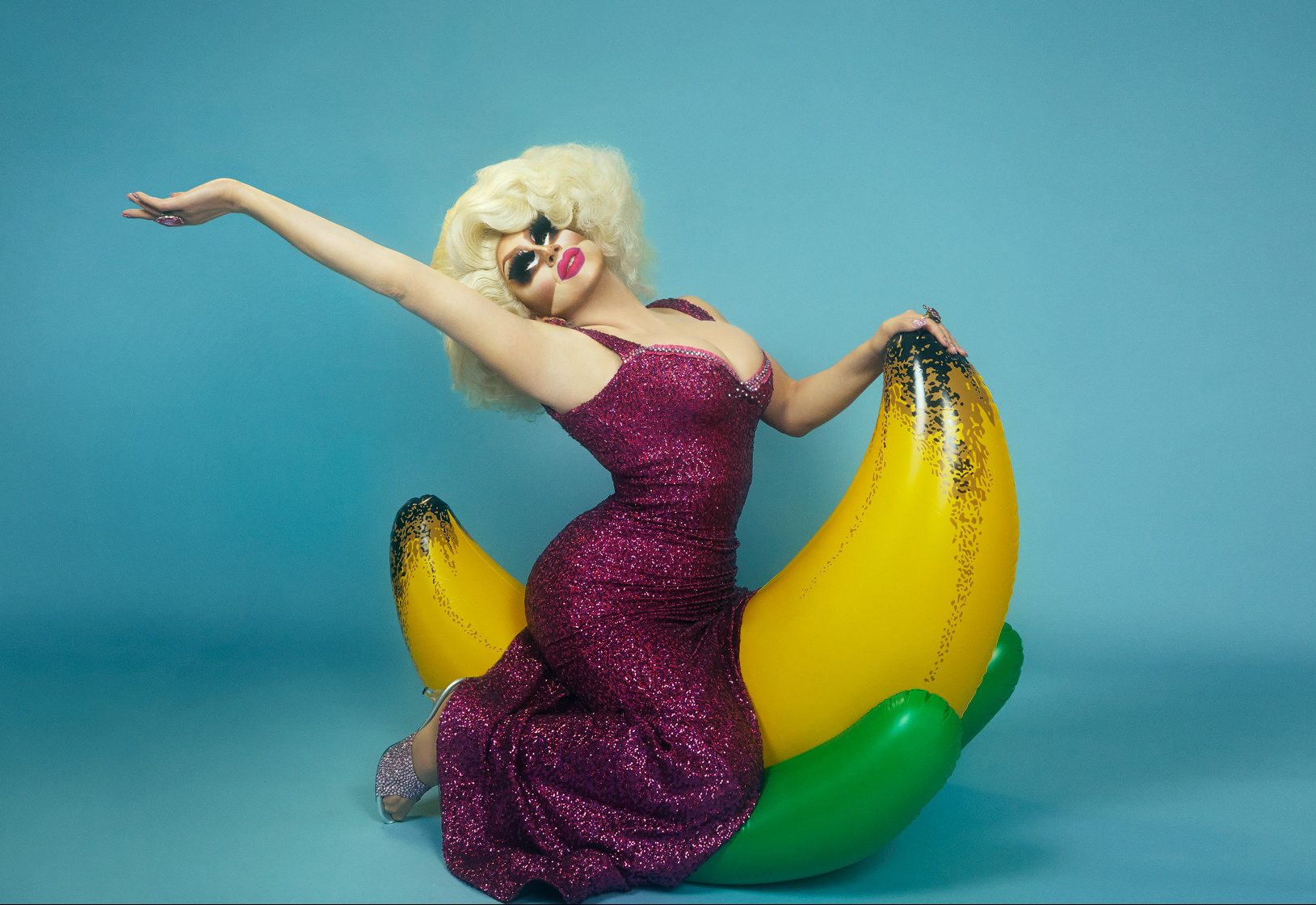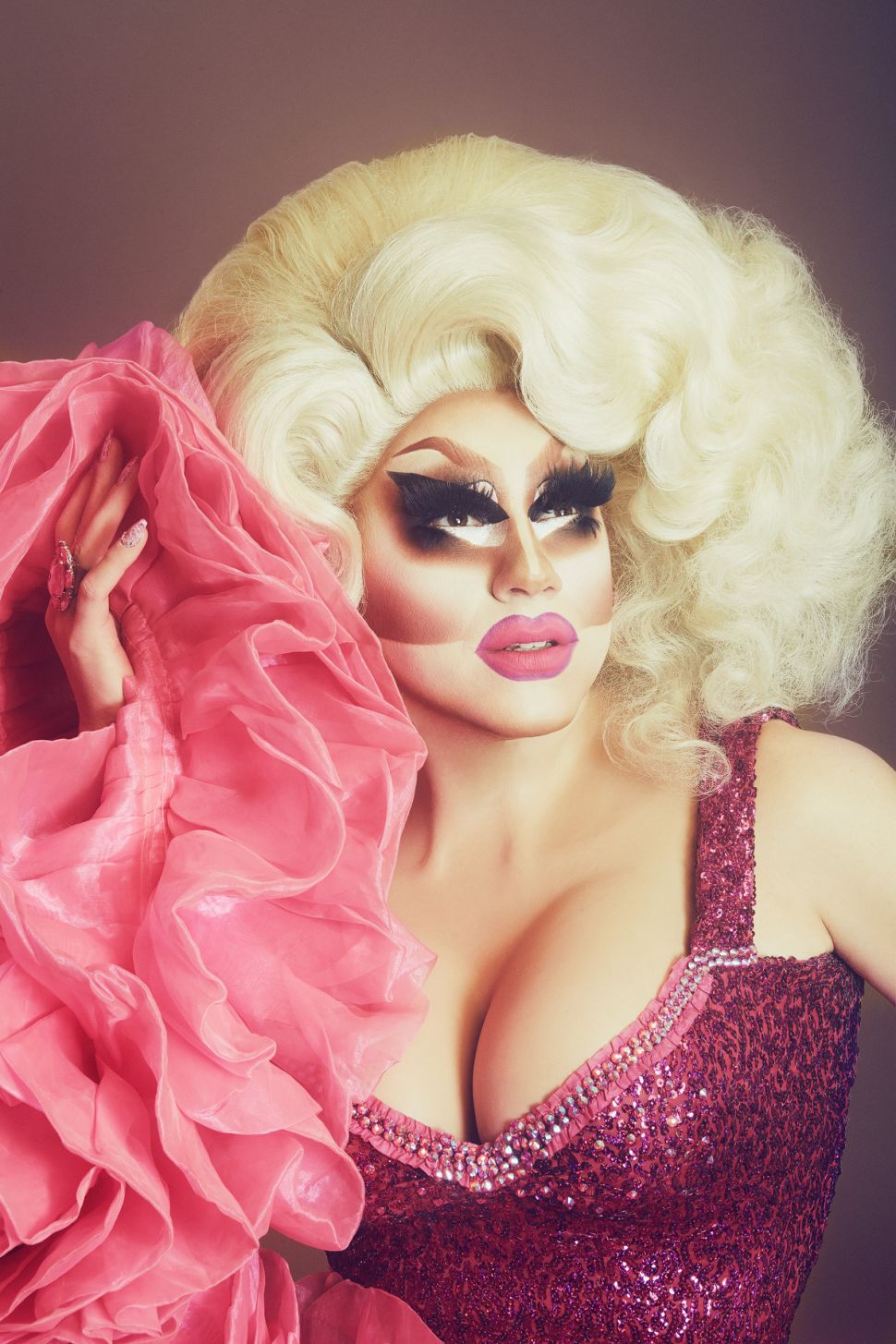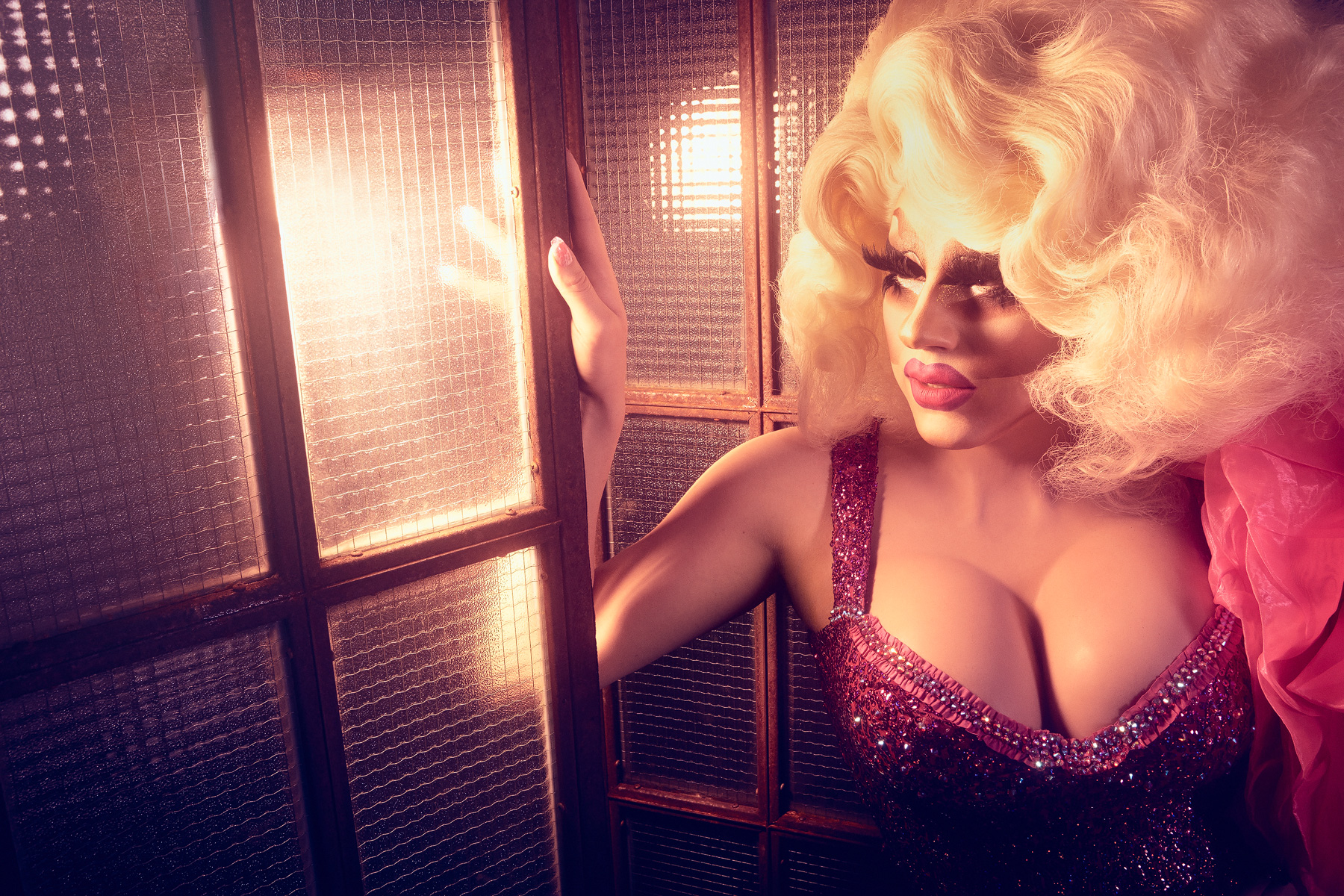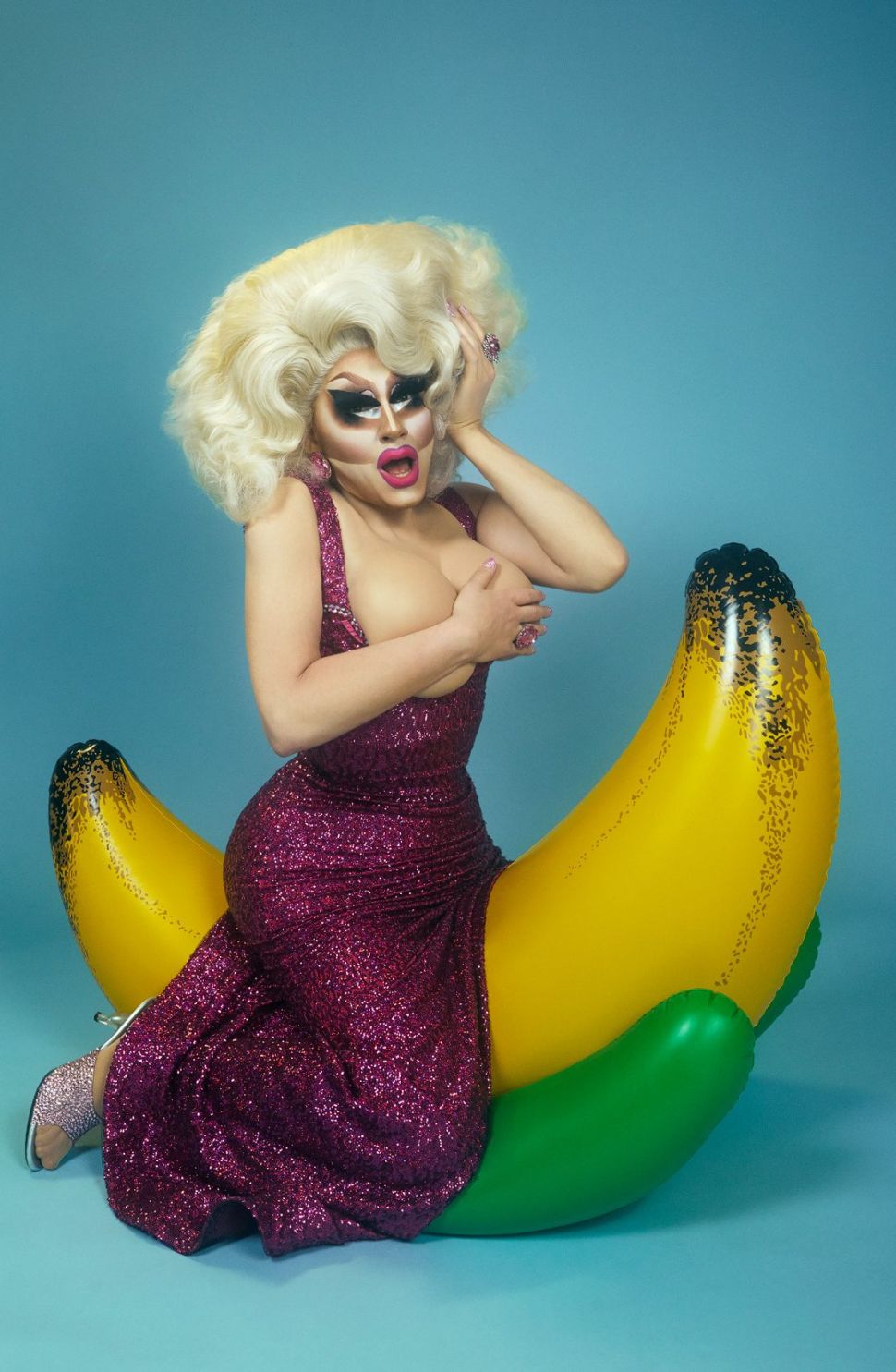
“So do you want to talk about my body?” is the kind of deadpan greeting you get from Trixie Mattel, the most cheerfully cynical, battered-but-unbowed drag queen in recent memory. It’s a fine suggestion: In full glam, the winner of RuPaul’s Drag Race All Stars Season 3 sure cuts a technically impressive figure—aerodynamic boobs drowsily chaperoned by a raspberry-spangled gown, face evocative of a close-range fireworks explosion at a Kabuki theater—but there are some major themes to address on the May afternoon when we meet.
In an era when drag queens are more spectacular than interesting as a rule, Mattel fascinates. Partly because out of drag, she’s an unprepossessing bald 29-year-old Wisconsinite of Native American parentage. Partly because of her two excellent albums, combinations of alt-country and alt-comedy that hold up next to the work of geniuses like Clem Snide. But largely because of her choices, including the new documentary Moving Parts, which followed Mattel around in the months surrounding her All Stars win.
Subscribe to Observer’s Entertainment Newsletter
Instead of being an extended comedy trailer for a fabulous new career, Parts delves into Mattel’s troubled childhood, the substance abuse of her comedy partner Katya (they host a popular YouTube show called UNHhhh), her bemusement with OTT fans and ambivalence toward drag itself. It’s a very punk career decision. Throughout, Mattel has no meltdowns. She’s her own housemother, tossing off as many no-bullshit affirmations as one-liners, making a hearty meal from a fusion of sedated ’90s irony and classic camp.
Watching that sensibility emerge out of makeup that could best be described as “those joke T-shirts from the ’80s that read, ‘I ran into Tammy Faye at the mall'” is something different indeed. So we asked her about all of it.
Observer: Why did you want to open a vein for the camera in this film? It would have been easy to do a puff piece—tons of one-liners and music—and just be very up and superficial.
Mattel: The interviewee in me is like, “I wanted it to be vulnerable!” But the real drag queen in me? When somebody said, “Let me make a movie about you,” I was like, “Yeah, let me just grab some scrunchies and my ice skates and my boombox!” I thought, I’m a celebrity. This is going to be a celebrity film. But the version of the film we see—it is almost a biopsy I never could have performed myself.
This film strips the makeup off the drag queen. If I were the editor, I would have been like, “Let’s show only the best moments of me in my tightest corset and my biggest wig with the funniest joke.” But this movie is about the stillness of the other 23 hours of not being onstage in a wig. People who know nothing about drag are going to watch this film and be like, “Oh, it’s really just like a bald guy crouching in his garage rifling through a suitcase.”
That was the first scene that raised an eyebrow for me: when you’re looking through fan mail and Drag Race ephemera. You say you hate being critiqued. That’s surprising because first of all, you don’t seem to lack for confidence, and second, that’s what the show is.
I’m probably one of the most resilient, bouncy-ball types. I get negative comments; I don’t really feel it. But during filming, I was at the finish line of getting one of the biggest accolades a drag queen can ever get. Everybody talks about winning, but nobody talks about the critique that comes with it. Once you’ve got something, people now have a reason to decide whether you should have it. The question becomes, Do you deserve it? Is it fair? In show business and competition in general, we put ourselves out there to be critiqued. I’ve done Drag Race before; I knew I was going to be critiqued. It still bothers you sometimes.
Does it get easier?
Oh, it gets easier. I do comedy. No matter how funny you are, you will just bomb. And I work in music as a drag queen who plays the guitar. That really is not for everyone. I play a type of music that traditionally doesn’t love drag—folk-country fans don’t also go to the gay bars. So I’m used to straddling two worlds, and that’s an uncomfortable position. But that’s the work I’m proudest of—the legacy work. I’m the first drag queen to release a country album.
One that’s brilliantly titled.
I wrote my first album, Two Birds, and thought, What if no one likes it? I had to pay for all my albums myself. So I decided I’m just going to do six songs, and if people like it, I’ll do a second album called One Stone. That way if nobody liked it, nobody had to know.

In meet-and-greets, your fans tell you heavy stuff—that they felt alone before they discovered you, that they were suicidal or depressed. You seem a bit disconnected in those moments. Do you feel like you’re being asked to assume a responsibility you didn’t sign up for?
It’s weird that this thing [gestures to self] helps people much younger than me who are in a completely different emotional place. I’m not depressed, but I always get the crowd that’s like, “You really helped me with my depression.” And I’m like, “Accidentally!” Because I’m not trying. I don’t sit down and think, How am I going to help people with this joke?
I think drag queens get on television, and then they’re like, “I just started doing drag to make a difference!” No, you didn’t! You started drag for free drinks and attention, just like the rest of us. I think that I’m unique to other drag queens in that I don’t change my story. I started doing drag because I liked dressing up and being funny, not to make sure people don’t do suicide. That’s fictional. Nobody does that. “Why did you start drag?” “Suicide!” No, you started because you didn’t want to pay cover at the club!
When people reach out to you with emotional stories, do you find that difficult to process?
You kind of get used to not being able to match that energy. When someone says, “I love you so much!” and they pull out a big [Trixie] tattoo, unless I have a tattoo of that person, I can’t really meet them at that level. But when people say, “I’ve never missed an episode of your YouTube series. It makes me laugh every week”—a compliment that’s specific means so much more. “I love you”? Maybe you don’t. But “I loved, in this episode, when you said this, and it was so funny”? That’s very sweet.
In the film, you talk about the abuse you suffered from your homophobic stepfather, who is now dead. In high school, he put a gun to your head. Social Services removed you from your house. Your mother didn’t particularly protest.
Oh, yeah. Keeping things light!
Why did you want to go there?
Well, I didn’t really want to. We filmed that after Nick [Zeig-Owens, the director] was sleeping in my house with a camera for six months. We were at a point where anything felt like it was on the table. We’d traveled the world together. And there was gin involved; it was a pink gin from Europe. I don’t like to talk about that stuff, because I don’t identify as a victim. I don’t think the story has ever been, “I wear a wig because bad things happened to me.”
And I think what victims forget is that they’re not special. Everybody has something bad happen to them. And the most prideful thing you can do is—I want people to think I was born at 18 years old. I don’t identify with anything that happened before that, because I don’t wish to carry it into today. I don’t like the narrative that you’re gay or you dress up because bad things happen to you, and I don’t want to perpetuate that, ’cause that’s not true.
You know how many drag queens have families who love them and love drag? But you never hear about it. You only hear, like, “My mom’s dead.” “Well, my mom’s a ghost.” “Well, my mom’s ghost haunts me!” Like, everybody’s trying to one-up each other.
How did your Native American heritage shape you, both as Trixie and offstage?
If you’ve ever been to a reservation, you know it’s not the most uplifting place. The modern reservation is not someplace where you think, I’m extremely proud. Because it’s disenfranchised people. The infrastructure isn’t even falling apart, because it was never really built. It’s cyclical: People have issues, but they have the funds to sort of perpetuate it.
I’m not Native American enough to say I’m Native American, because people get mad. I have a costume in one of my touring shows that’s a headdress, and people are like, “How dare you!” just because I have a blonde wig on. The character of Trixie is more of a critique on Caucasian-American consumerism. Besides being Native American, I came from deep, deep poverty. Poorest kid in my school, poorest kid in the county. It made me a little scrappy. You have to be scrappy to be a drag queen, because you have to do everything yourself.
It sounds like it.
Plus, I present as a white guy with a shaved head. For comedy, that isn’t a great look, so I’m really lucky to have this chicken suit to use as an instrument.

In the film, your mom comes to your show, although drag and gay culture clearly make her a bit uncomfortable. What is your relationship like now? Has she seen the movie?
She hasn’t. But my mom has never heard my albums or watched Drag Race either—we’re so country that she’s just not really interested. But everything we talk about in the film, my mom and I have talked about. At 29 years old, it’s all
That’s impressive. People spend great sums in therapy, trying to get to that place of release, and never do.
What do you gain by staying mad at people? My brother was so mad at my mom for so long, and I was like, for what? The thing about abuse is, when you’re in it, you have no clarity. You think it’s normal. So how can you really blame somebody? Get over yourself.
You’re quite self-deprecating about drag. In the film you say, “Drag is so stupid—until the last 10 seconds,” and that it’s not the same as winning the Olympics, and quote Katya saying that drag, at best, is still a failure. Why?
It is cool. But part of the fun of drag is that nobody thinks it’s a woman. It’s a room full of people going, “OK, for the next 90 minutes, let’s pretend this is happening.” I mean, it’s not happening! Even I know I’m not this person. It’s a suspension of disbelief. We all know that this is just paint and hair. I’m not that different from a rag doll. It’s all fabricated. I don’t think it’s a good look to be a drag queen who’s like, “I’m beautiful and perfect!” It’s a better look to feel great about what you do, but acknowledge what you do is very stupid. I’m very serious about being stupid.
Your songwriting is really accomplished and witty. Why not take off the drag and perform the songs out of character?
Well, if my luggage ever gets lost, I will. But my act is music and comedy; it’s more successful for me. And I like deep, dark comedy. I mean, there’s a Columbine joke in this movie! I like that drag gives me my license to kill. It’s my chicken suit that I can murder people in. Dressing up is also fun. It gives you this crazy amount of confidence that I don’t really manifest out of drag. I mean, come on: I’m a white guy with a guitar—not that special. John Mayer and James Taylor had the jump on me a little bit.
Has RuPaul given you feedback on your career lately?
Yeah, I saw her recently. We were talking, and she got up close to me, and I’ll never forget it. She said, “Get the hell out of my house!” I thought that was really sweet.
No, she said, “I have to tell you, you’re doing things nobody’s ever done. Not even me.” I thought that was cool. And then she said, “Who are you?” Because, you know, there’s the running joke that RuPaul doesn’t know any of our names.

You seem to be pretty mindful of leaving drag and a possible life after drag. At one point in the movie you say, “If this doesn’t work out, I’ll just sell the dresses, take the money and run.”
Oh, my God. Even if it all went away today, am I going to complain that I traveled the world for years as one of the most accomplished people in my field? I don’t expect it to last forever. Even RuPaul’s career ebbs and flows. Before Drag Race, she was not the RuPaul we know now. She was somebody who hadn’t had a hit in 10 years. And she always talks about how entertainment is not about how famous you are right now.
The winner of All Stars is supposed to receive a year’s worth of cosmetics. Did you in fact get a year’s worth of cosmetics?
Yes, it all showed up at my house.
How much is that exactly?
It’s so many boxes. Anastasia of Beverly Hills sent me two of everything. The only thing I run through quickly is pink lipstick. I’m an easy customer—just give me 40 of this pink lipstick, and I’m cool. But I did joke that when I won, they were like, “Shit, we just took a financial hit. We’re gonna have to back a truck up to her house.” There are a few products I don’t use, because they’re not the right color for me, and I donate them to a women’s shelter. [Wryly] I guess I’m just, like, a good person.
Trixie Mattel just released her latest single, “Yellow Cloud.”
Correction: A previous version of this article stated that Mattel is a Minnesotan. She is actually a Wisconsinite.

